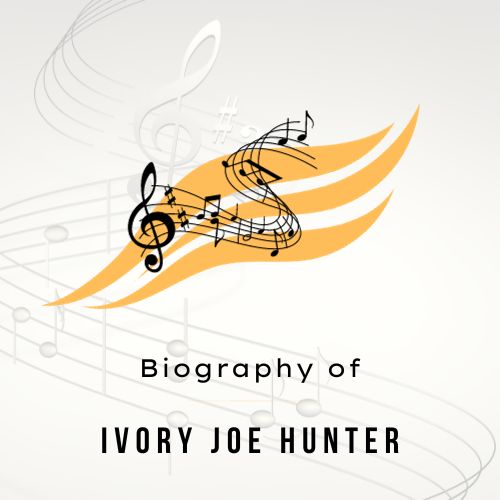Introduction
Ivory Joe Hunter was an American singer-songwriter and pianist, covering in a number of genres that included R&B, blues, jazz and country. He was an accomplished and prolific songwriter as well as a singer. For a time Hunter hosted his own radio show in Beaumont, Texas before moving to California in the early 1940s. There, Hunter formed his own label Ivory Records where he issued his first single “Blues at Sunrise” with the Three Blazers as backup singers. In the late 1940s, Hunter founded another label Pacific Records, whose “Pretty Mama Blues” became his first R&B #1 hit, settling there for a number of weeks. Another couple of follow ups “I Almost Lost My Mind” and “I Need You So” were issued on MGM Records and both became R&B chart-toppers in 1950. Pat Boone covered “I Almost Lost My Mind” and turned it into a pop hit, while Elvis Presley did “I Need You So” as well as few others. Hunter recorded prolifically in many other labels such as King and most particularly Atlantic. Hunter scored his last pop hit with a cover of Bill Anderson’s “City Lights” in 1959 (at #92). After a string of R&B hits, Hunter made a comeback as a country singer in the late 1960s. His predilection to country was evidenced in his later releases like “I’ve Always Been Country” and his regular appearances at the Grand Ole Opry where he was eventually honored. Lung cancer claimed Hunter’s life in 1974, aged 60.
Early life and career
Singer-songwriter and pianist Ivory Joe Hunter’s name was not a stage name, but actually a name on his birth certificate. He was born in Kirbyville, Texas on October 10, 1914. Music ran in his blood; his parents also had talent in singing and performing. He was quite a piano prodigy. When he was a teenager he etched his first recording on a cylinder at the Library of Congress in 1933.
Hunter was already an accomplished pianist and tunesmith who performed around the Gulf Coast. He then hosted his own radio show at a local station in Beaumont, Texas before moving to Los Angeles, California in 1942. While there, he found plenty of work.
Hunter joined the West Coast Blues outfit Johnny Moore’s Three Blazers, who backed him in his first single “Blues at Sunrise.” It was released on Hunter’s self-established label Ivory Records and distributed to Leon Rene’s Exclusive record label. It eventually became a national hit, peaking at #3 on the R&B singles chart in 1945.
A hot R&B commodity
After Ivory Records, Hunter also established another label Pacific Records. He also cut records for Four Star Records and the Cincinnati, Ohio based King Records in the late 1940s. There, he achieved other hits with “Don’t Fall In Love With Me” (#8 R&B), “Pretty Mama Blues” (#1 R&B), “Waiting In Vain” (#5 R&B), “Jealous Heart” (#2 R&B), “Landlord Blues” (B-side to “Guess Who”; #6), and many others.
In the 1950s Hunter signed with MGM Records, which was then just a fledgling in the recording business. On that label, he released two singles “I Almost Lost My Mind” and “I Need You So,” both of which went to the top of R&B singles charts. Hunter later scored other R&B hits on MGM: “I Quit My Pretty Mama,” “It’s A Sin,” and “S.P. Blues.” With his velvety-smooth voice, the bespectacled Hunter became really popular especially on the R&B circuit. “I Almost Lost My Mind” would later be recorded by white singer Pat Boone, who made it a #1 pop smash.
Hunter became busy, touring across the country along with his backing band. He also made his first TV appearance on the popular human interest show You Asked For It.
One big pop hit and later a country music star
Hunter moved to Atlantic Records in 1954. Often backed by his band Ivorytones, Hunter continued to achieve hits such as “It May Sound Silly” (#14 R&B), “A Tear Fell” (#15 R&B), “Love’s A Hurting Game” (#2 R&B), and his first and only Top 20 pop hit “Since I Met You Baby,” which peaked at #12 on the Billboard Hot 100 (and #1 on the R&B singles chart). His last charting hit for Atlantic was “Yes, I Want You,” which placed on the lower rungs of Hot 100 in the late 1950s. His last charting single was 1959s “City Lights” which became a minor pop hit.
Even when he was a hot R&B commodity way back when, Hunter also got noticed by the country music community. When his R&B dried up and after a long absence from the limelight, Hunter made a comeback as a country singer in the late 1960s, even releasing a full-length record of country material “I’ve Always Been Country.” Since his comeback he had made regular appearances at the Grand Ole Opry. He also later gigged at the Monterey Jazz Festival. He was later honored by both prestigious festivals.
Hunter died in Memphis, Tennessee in 1974, of lung cancer. He was 60 years old. His remains are now interred near his birthplace in Kirbyville, Texas.

